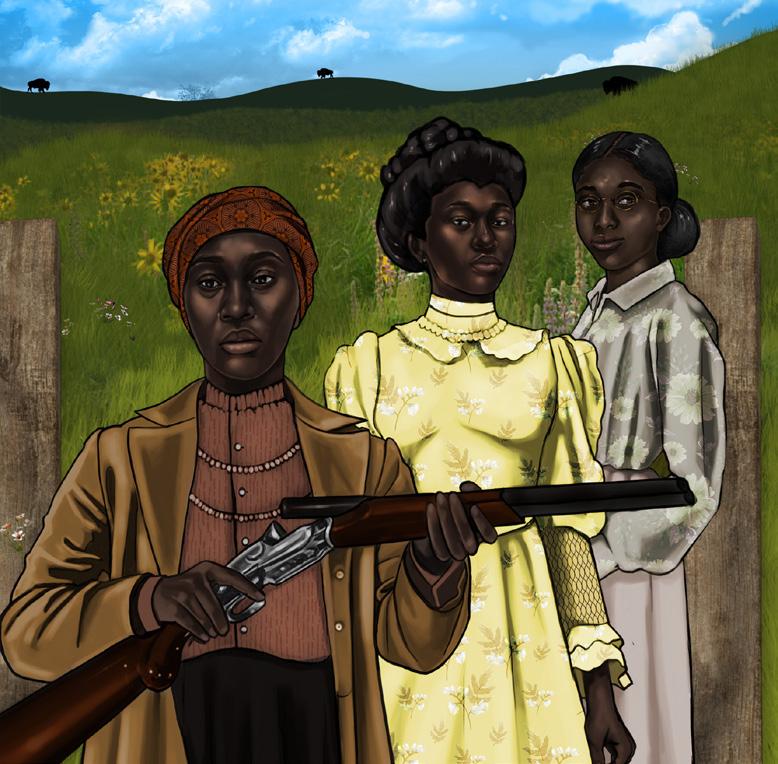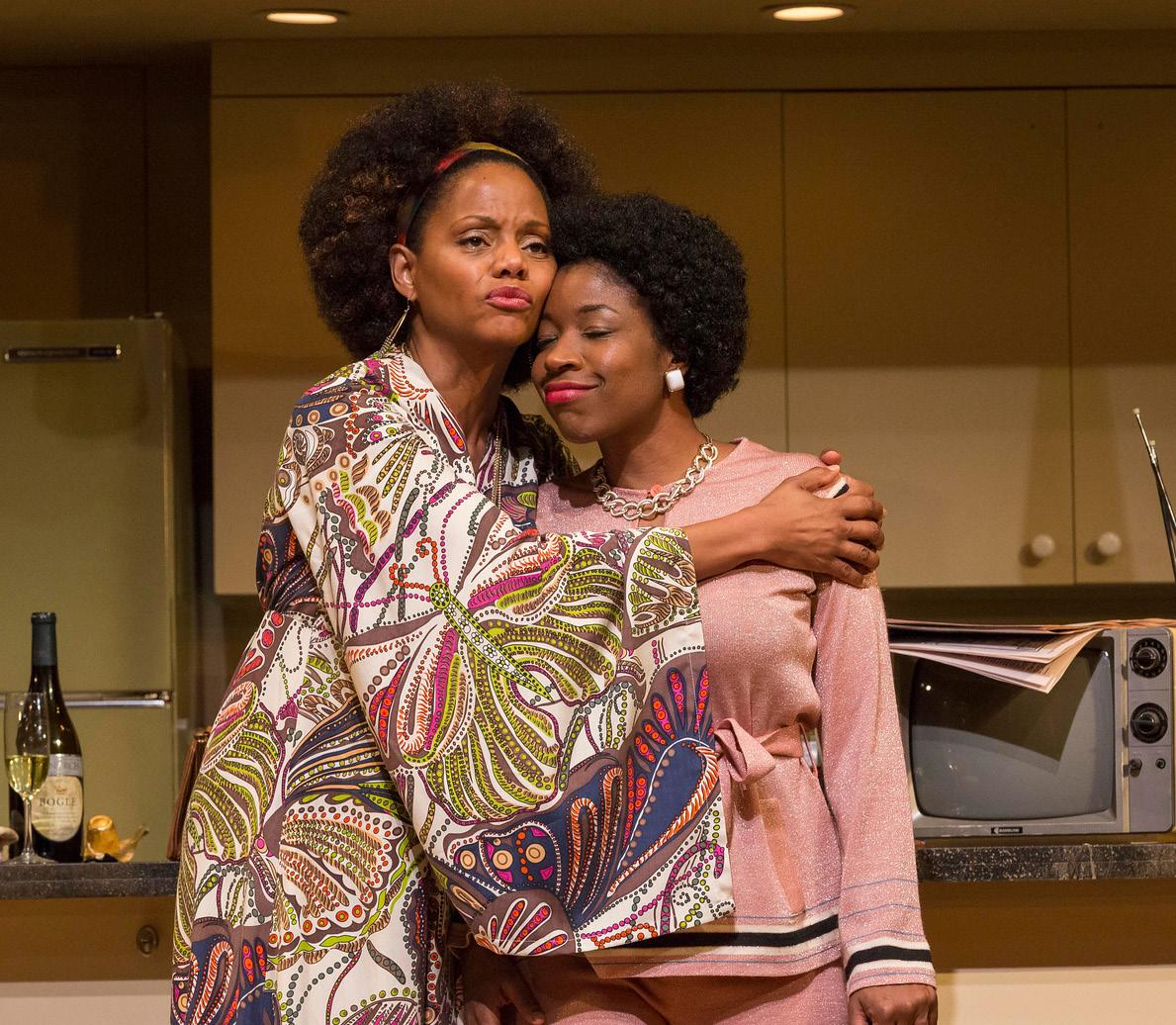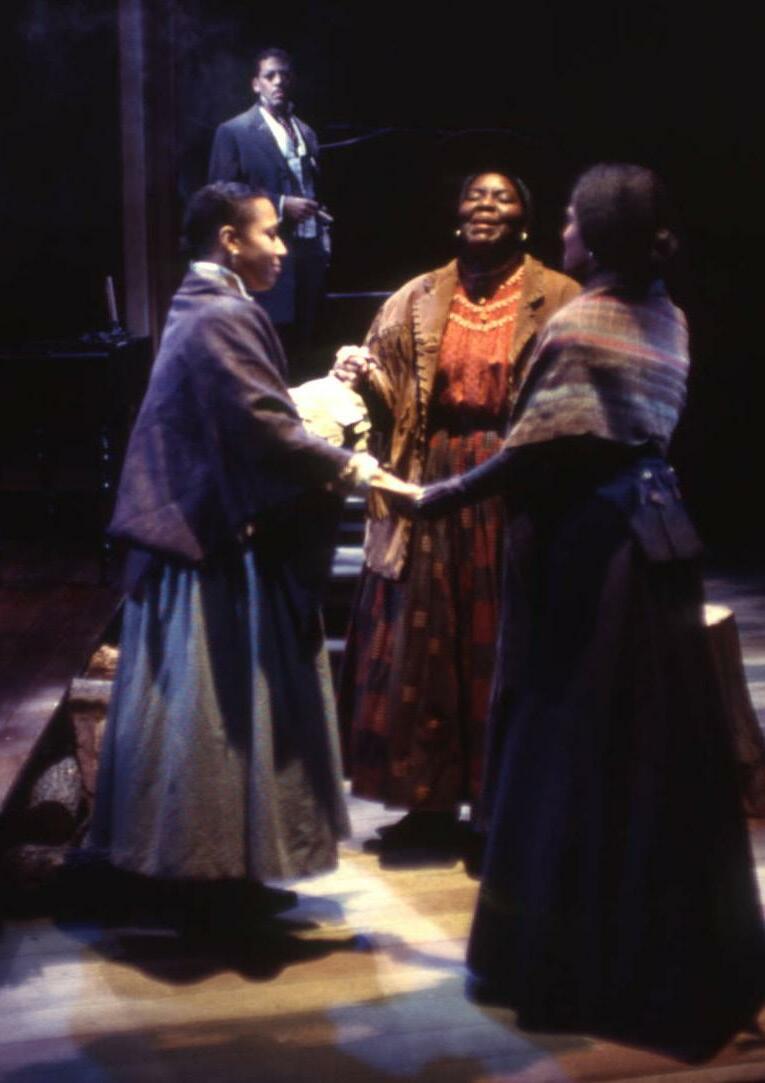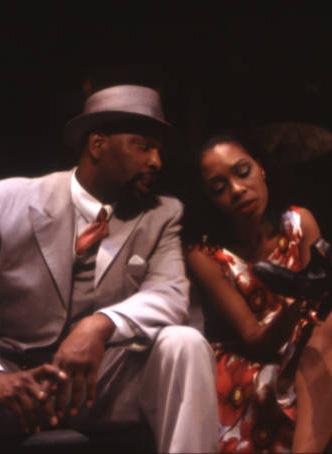
5 minute read
Staff
Flyin’
West
by Pearl Cleage
ONEAMERICA MAINSTAGE JANUARY 11 – FEBRUARY 4

Share your review on social media by tagging us at @IRTLIVE, using #IRTLIVE or by emailing REVIEWS@IRTLIVE.COM
SCENIC DESIGNER: Junghyun Georgia Lee LIGHTING DESIGNER: Thom Weaver
SEASON 2022-2023
Scenic Designer_______________________
JUNGHYUN GEORGIA LEE Costume Designer _________________________ LEVONNE LINDSAY Lighting Designer _______________________________ THOM WEAVER Sound Designer_____________________________ MICHAEL KILEY Dramaturg_____________________________ RICHARD J ROBERTS Stage Manager _____________________________ BECKY ROEBER
making the arts happen Margot Lacy Eccles Artistic Director
THE CAST (in order of speaking) Sophie Washington_____________ LAKESHA LORENE Miss Leah____________ DWANDRA NICKOLE LAMPKIN Fannie Dove_________________ L’OREAL LAMPLEY Wil Parish______________________ ENOCH KING Minnie Dove Charles____________ KAYLA MARY JANE Frank Charles__________________ ALLEN TEDDER
Flyin’ West is presented by special arrangement with Dramatists Play Service, Inc., New York. Flyin’ West was originally commissioned and produced by the Alliance Theatre Company, Atlanta, Georgia— Kenny Leon, Artistic Director, and Edith Love, Managing Director—in association with AT&T On Stage. The play was developed with support from the Lila Wallace–Reader’s Digest Fund Resident Theatre Initiative. Fight Choreographer: Denise Alessandria Hurd | Dialect Coach and Intimacy Coordinator: Rachel Finley Wig Design: Jerrilyn Lanier-Duckworth | Assistant to the Director: María Amenábar Farias Actors and stage managers are members of Actors’ Equity Association, the Union of Professional Actors and Stage Managers in the United States. The director is a member of the Stage Directors and Choreographers Society, a national theatrical labor union. Scenic, costume, lighting, and sound designers are represented by United Scenic Artists Local 829, IATSE. Photography and recording are forbidden in the Theatre. The videotaping of this production is a violation of United States Copyright Law and an actionable Federal Offense.
Original artwork by Tasha Beckwith
SETTING
Fall, 1898, outside the all-Black town of Nicodemus, Kansas.
APPROXIMATE RUN TIME: 2 hours and 20 minutes, including a 15 minute intermission.
Act One Scene 1______________________ A fall evening Scene 2___________ Two days later, early afternoon Scene 3________________ The same day, evening Scene 4___________________ The next morning Scene 5_____________________ Late that night
Act Two Scene 1 ________________ Early the next morning Scene 2__________ The next Sunday, early morning Scene 3___________________ Sunday afternoon Scene 4____________________ Sunday evening Scene 5____________________ Monday morning

Producing Pearl Cleage’s work this 50th anniversary season is both intentional and celebratory. As one of the wisest voices in the African American writing community, and, arguably, our most revered African American woman playwright, Cleage’s work has appeared on IRT stages three previous times. In 1994 we produced the Midwest premiere of Flyin’ West; in 2003 we produced her Blues for an Alabama Sky; and in 2015 we produced her What I Learned In Paris—all very different, memorable, and moving, and all deeply insightful productions. Returning to Flyin’ West, 30 years after its writing, is to reinvestigate a work that has now become a classic and has only gained in stature, eloquence, and community need.
Cleage’s voice sings most deeply at the intersection of feminism and racism, lifting stories of African American womanhood and survivorship. She writes:
My response to the oppression I face is to name it, describe it, analyze it, protest it, and propose solutions to it as loud[ly] as I possibly can every time I get the chance. I purposely people my plays with fast-talking, quick-thinking black women since the theatre is, for me, one of the few places where we have a chance to get an uninterrupted word in edgewise.
Flyin’ West is a testament to exactly that thinking. Cleage peoples her play with a group of four strong women whom she places in the historic town of Nicodemus, Kansas, just before the turn of the last century. Thirtyfive years after the Emancipation Proclamation, these women fight to make a place for themselves as free citizens and landowners. Through their trials, and the many forces aligned to limit their power, Cleage also reveals a little-known chapter in American history, one shared deeply in Indiana: the creation of all-Black towns. Indiana once was home to at least 30 of these Pan African settlements, established in the decades between 1820 and 1850. Of those, the only remaining community is Lyles Station in Gibson County in southwest Indiana. You may remember this as the birthplace of a storied Indiana personage, Alonzo Fields, the subject of IRT’s playwrightin-residence James Still’s much-loved Looking Over the President’s Shoulder.

Because Cleage is gifted in many writing genres, including fiction, journalism, poetry, and playwriting, she is well attuned to the differences in each. Her craft as a playwright is remarkable and highly theatrical. As a theatre-goer, one is always aware of the intensity of her storytelling, as well as her ability to deliver characters and plot in a way that is utterly captivating—and never to be confused with film or television writing. Awardwinning actor Ruby Dee wrote eloquently:
Pearl Cleage is a passionate, challenging playwright whose concerns for the species are unmistakable and profound. As a woman, as an African-American, her artistic objectivity and sensitivity to history combine with, but do not overshadow, her capacity to dig for truth and present it flat out as she sees it—with a finger snap or a shout and sometimes with a wink. Among the most satisfying roles I’ve undertaken on stage is surely Miss Leah in Flyin’ West. She brings the bushel nuggets of drama and humor that capture the ear, the heart, and the imagination. She’s devilish, too.
As a life-long activist, Cleage uses her voice as a clarion call to action. She urges us to remember our history and use it to change the future. This is a viewpoint that is embraced by the production’s director, Raelle Myrick Hodges, whose refreshing approach to the play reminds us that art must always be multi-faceted in its communication: it reminds us of who we have been, who we can be, and how the narrative of this country must change for the better.







